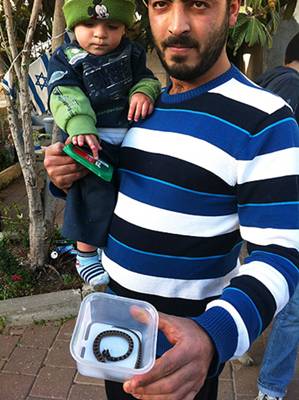
A sleepy snake came to a rather untimely finish when having its head [*fr1] chewed off by a fearless toddler in an Arab city in northern Israel, the child's family said.
Thirteen-month-old Imad Aleeyan, who has six teeth, was found chewing on the top of the 30cm snake by his mother, who alerted the neighbourhood along with her screams.
"I was creating his milk and that i looked over and saw he had a snake in his mouth," said his mother, Ghadir Aleeyan who lives within the city of Shefa'Amr, 15km east of the port town of Haifa.
"I began to scream. i could not believe my eyes," she told AFP. "I nearly died of fright."
Her screams brought the remainder of the family, and also the neighbourhood, running.
"We rushed in and located the baby with a snake in his mouth, chewing it. it absolutely was very scary, simply horrible," the boy's aunt, Yasmin Shahin, said.
A neighbour who had rushed to ascertain what was happening yanked the half-dead reptile out of the boys mouth and killed it, she said.
"When he pulled it out, Imad started crying," she said, describing the snake's head as "very badly chewed" when it emerged from the boys mouth.
They immediately checked the kid for any bite marks however found none, with doctors at Rambam hospital in Haifa confirming he was unharmed.
"Doctors at the hospital told us the snake was very toxic however that we tend to were terribly lucky as a result of they unleash less venom within the winter," she said.
But Dr Boaz Shacham, an professional on amphibians and reptiles, told AFP that from staring at pictures of the smashed-up serpent on-line, it looked as if it would be a coin- marked snake (hemorrhois nummifer), a non-venomous species that resembles a viper.
Such snakes age to 1,3m in length, he said suggesting it absolutely was a "very young" specimen.
"It in all probability did not bite the kid thanks to the cold," said Shacham who is that the head of the herpetology assortment at the Hebrew University of Jerusalem.
"They aren't very active in winter."
No comments:
Post a Comment